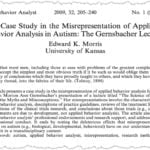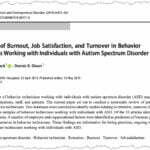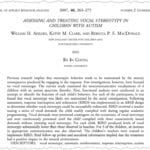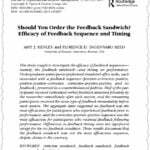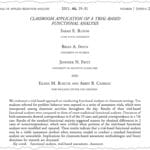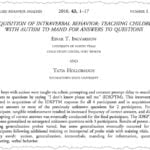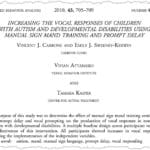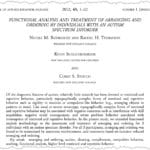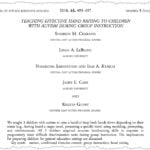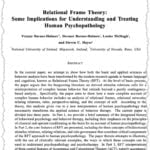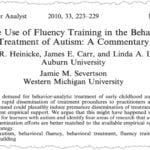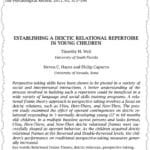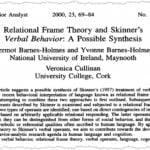Filters Sort results
Reset Apply
An award-winning, interactive, multimedia tutorial that will help you master the key concepts, terms, and approach of Relational Frame Theory (RFT), a behavior-analytic account of human language and cognition. RFT… Show more (+) An award-winning, interactive, multimedia tutorial that will help you master the key concepts, terms, and approach of Relational Frame Theory (RFT), a behavior-analytic account of human language and cognition. RFT provides a framework for an analysis of complex human behavior that serves as the basis of promising new interventions in applied behavior analysis or ABA (e.g., PEAK Relational Training System) and clinical psychology (e.g., Acceptance and Commitment Therapy). Show less (-)
BCBA CEUs:
7 |
||
A Case Study in the Misrepresentation of Applied Behavior Analysis in Autism: The Gernsbacher Lectures
Edward K. Morris
Read the following article and pass a 15-question quiz on it:
Morris, E. K. (2009). A case study in the misrepresentation of applied behavior analysis in autism: The Gernsbacher lectures. The Behavior… Show more (+) Read the following article and pass a 15-question quiz on it:
Morris, E. K. (2009). A case study in the misrepresentation of applied behavior analysis in autism: The Gernsbacher lectures. The Behavior Analyst, 32, 205-240. Show less (-)
BCBA CEUs:
3.5 3.5 |
||
An Introduction to Verbal Behavior
Norman Peterson
An interactive, multimedia tutorial that will help you master the key concepts, terms, and approach of B.F. Skinner’s analysis of verbal behavior and language
BCBA CEUs:
8 |
||
Mastering the Basics of Visual Analysis
Katie Wolfe & Timothy A. Slocum
This tutorial offers a systematic, evidence-based procedure for training individuals to conduct valid and reliable visual analyses of single-subject data. It features extensive discrimination training and practice opportunities; adaptive instruction… Show more (+) This tutorial offers a systematic, evidence-based procedure for training individuals to conduct valid and reliable visual analyses of single-subject data. It features extensive discrimination training and practice opportunities; adaptive instruction and remediation for errors; and full audio narration in a self-paced, mobile-friendly format. Show less (-)
BCBA CEUs:
2 |
||
Predictors of Burnout, Job Satisfaction, and Turnover in Behavior Technicians Working with Individuals with Autism Spectrum Disorder
Marlena N. Novack & Dennis R. Dixon
Read the following article and pass a 6-question quiz on it:
Novack, M. N., & Dixon, D. R. (2019). Predictors of burnout, job satisfaction, and turnover in behavior technicians working with… Show more (+) Read the following article and pass a 6-question quiz on it:
Novack, M. N., & Dixon, D. R. (2019). Predictors of burnout, job satisfaction, and turnover in behavior technicians working with individuals with autism spectrum disorder. Review Journal of Autism and Developmental Disorders, 6, 413-421.
Show less (-)
BCBA CEUs:
1 1 |
||
Assessing and Treating Vocal Stereotypy in Children with Autism
William H. Ahearn, Kathy M. Clark, Rebecca P. F. MacDonald, & Bo In Chung
Read the following article and pass a 5-question quiz on it:
Ahearn, W. H., Clark, K. M., MacDonald, R. P., & Chung, B. O. (2007). Assessing and treating vocal stereotypy in… Show more (+) Read the following article and pass a 5-question quiz on it:
Ahearn, W. H., Clark, K. M., MacDonald, R. P., & Chung, B. O. (2007). Assessing and treating vocal stereotypy in children with autism. Journal of Applied Behavior Analysis, 40(2), 263-275.
Show less (-)
BCBA CEUs:
1 |
||
Should You Order the Feedback Sandwich? Efficacy of Feedback Sequence and Timing
Amy J. Henley & Florence D. DiGennaro Reed
Read the following article and pass a 5-question quiz on it:
Henley, A. J., & DiGennaro Reed, F. D. (2015). Should you order the feedback sandwich? Efficacy of feedback sequence and… Show more (+) Read the following article and pass a 5-question quiz on it:
Henley, A. J., & DiGennaro Reed, F. D. (2015). Should you order the feedback sandwich? Efficacy of feedback sequence and timing. Journal of Organizational Behavior Management, 35, 321-335.
Show less (-)
BCBA CEUs:
1 1 |
||
Classroom Application of a Trial-Based Functional Analysis
Sarah E. Bloom, Brian A. Iwata, Jennifer N. Fritz, Eileen M. Roscoe, & Abbey B. Carreau
Read the following article and pass a 5-question quiz on it:
Bloom, S. E., Iwata, B. A., Fritz, J. N., Roscoe, E. M., & Carreau, A. B. (2011). Classroom application of… Show more (+) Read the following article and pass a 5-question quiz on it:
Bloom, S. E., Iwata, B. A., Fritz, J. N., Roscoe, E. M., & Carreau, A. B. (2011). Classroom application of a trial-based functional analysis. Journal of Applied Behavior Analysis, 44(1), 19-31. Show less (-)
BCBA CEUs:
1 |
||
Acquisition of Intraverbal Behavior: Teaching Children with Autism to Mand for Answers to Questions
Einar T. Ingvarsson & Tatia Hollobaugh
Read the following article and pass a 7-question quiz on it:
Ingvarsson, E. T., & Hollobaugh, T. (2010). Acquisition of intraverbal behavior: Teaching children with autism to mand for answers to… Show more (+) Read the following article and pass a 7-question quiz on it:
Ingvarsson, E. T., & Hollobaugh, T. (2010). Acquisition of intraverbal behavior: Teaching children with autism to mand for answers to questions. Journal of Applied Behavior Analysis, 43(1), 1-17. Show less (-)
BCBA CEUs:
1.5 |
||
Increasing the Vocal Responses of Children with Autism and Developmental Disabilities Using Manual Sign Mand Training and Prompt Delay
Vincent J. Carbone, Emily J. Sweeney-Kerwin, Vivian Attanasio, & Tamara Kasper
Read the following article and pass a 7-question quiz on it:
Carbone, V. J., Sweeney-Kerwin, E. J., Attanasio, V., & Kasper, T. (2010). Increasing the vocal responses of children With autism… Show more (+) Read the following article and pass a 7-question quiz on it:
Carbone, V. J., Sweeney-Kerwin, E. J., Attanasio, V., & Kasper, T. (2010). Increasing the vocal responses of children With autism and developmental disabilities using manual sign mand training and prompt delay. Journal of Applied Behavior Analysis, 43(4), 705-709. Show less (-)
BCBA CEUs:
0.5 |
||
ABA Terminology for Effective Practice
Melissa Mackal & Robert Wallander
This tutorial provides both an introductory and practical review of what behavior-analytic terminology is, when you should use it, and the reasons why using it is so crucial to effective… Show more (+) This tutorial provides both an introductory and practical review of what behavior-analytic terminology is, when you should use it, and the reasons why using it is so crucial to effective and ethical practice. Show less (-)
BCBA CEUs:
1 1 |
||
Functional Analysis and Treatment of Arranging and Ordering by Individuals with an Autism Spectrum Disorder
Nicole M. Rodriguez, Rachel H. Thompson, Kevin Schlichenmeyer, & Corey S. Stocco
Read the following article and pass a 9-question quiz on it:
Rodriguez, N. M., Thompson, R. H., Schlichenmeyer, K., & Stocco, C. S. (2012). Functional analysis and treatment of arranging and… Show more (+) Read the following article and pass a 9-question quiz on it:
Rodriguez, N. M., Thompson, R. H., Schlichenmeyer, K., & Stocco, C. S. (2012). Functional analysis and treatment of arranging and ordering by individuals with an autism spectrum disorder. Journal of Applied Behavior Analysis, 45 (1), 1-22.
Show less (-)
BCBA CEUs:
2 |
||
Teaching Effective Hand Raising to Children with Autism During Group Instruction
Shaireen M. Charania, Linda A. LeBlanc, Narmatha Sabanathan, Inas A. Ktaech, James E. Carr, & Kristin Gunby
Read the following article and pass a 5-question quiz on it:
Charania, S. M., LeBlanc, L. A., Sabanathan, N., Ktaech, I. A., Carr, J. E., & Gunby, K. (2010). Teaching effective… Show more (+) Read the following article and pass a 5-question quiz on it:
Charania, S. M., LeBlanc, L. A., Sabanathan, N., Ktaech, I. A., Carr, J. E., & Gunby, K. (2010). Teaching effective hand raising to children with autism during group instruction. Journal of Applied Behavior Analysis,43(3), 493-497.
Show less (-)
BCBA CEUs:
0.5 |
||
Relational Frame Theory: Some Implications for Understanding and Treating Human Psychopathology
Yvonne Barnes-Holmes, Dermot Barnes-Holmes, Louise McHugh, & Steven C. Hayes
Read the following article and pass an 8-question quiz on it:
Barnes-Holmes, Y., Barnes-Holmes, D., McHugh, L., & Hayes, S. C. (2004). Relational frame theory: Some implications for understanding and treating… Show more (+) Read the following article and pass an 8-question quiz on it:
Barnes-Holmes, Y., Barnes-Holmes, D., McHugh, L., & Hayes, S. C. (2004). Relational frame theory: Some implications for understanding and treating human psychopathology. International Journal of Psychology and Psychological Therapy, 4, 355-375.
Show less (-)
BCBA CEUs:
1.5 |
||
On the Use of Fluency Training in the Behavioral Treatment of Autism: A Commentary
Megan R. Heinicke, James E. Carr, Linda A. LeBlanc, & Jamie M. Severtson
Read the following article and pass a 5-question quiz on it:
Heinicke, M. R., Carr, J. E., LeBlanc, L. A., & Severtson, J. M. (2010). On the use of fluency training… Show more (+) Read the following article and pass a 5-question quiz on it:
Heinicke, M. R., Carr, J. E., LeBlanc, L. A., & Severtson, J. M. (2010). On the use of fluency training in the behavioral treatment of autism: A commentary. The Behavior Analyst, 33(2), 223-229. Show less (-)
BCBA CEUs:
0.5 |
||
B.F. Skinner on Education
B.F. Skinner
In this 1972 conversation with John M. Whiteley, B.F. Skinner addresses a variety of important issues in education that remain relevant today. He advocates using positive reinforcement and behavioral approaches… Show more (+) In this 1972 conversation with John M. Whiteley, B.F. Skinner addresses a variety of important issues in education that remain relevant today. He advocates using positive reinforcement and behavioral approaches to instruction to improve both our educational system and our culture. Topics addressed include aversive control, free will, effective instruction, morality, culture, philanthropy, educational reform, and programmed versus natural contingencies. Show less (-)
BCBA CEUs:
1.5 |
||
Reducing Biases in Clinical Judgment with Single-Subject Treatment Design
Daniel J. Moran & Wendi Tai
Read the following article and pass a 12-question quiz on it:
Moran, D. J., & Tai, W. (2001). Reducing biases in clinical judgment with single-subject treatment design. The Behavior Analyst Today, 2(3)… Show more (+) Read the following article and pass a 12-question quiz on it:
Moran, D. J., & Tai, W. (2001). Reducing biases in clinical judgment with single-subject treatment design. The Behavior Analyst Today, 2(3), 196-203. Show less (-)
BCBA CEUs:
1 |
||
Chomsky vs. Skinner: In Their Own Words
Noam Chomsky & B.F. Skinner
In 1957, B.F. Skinner published the book Verbal Behavior. In 1959, a young linguist named Noam Chomsky published a review of that book that sharply criticized Skinner's behaviorism in general… Show more (+) In 1957, B.F. Skinner published the book Verbal Behavior. In 1959, a young linguist named Noam Chomsky published a review of that book that sharply criticized Skinner's behaviorism in general and his behavioral approach to language acquisition in particular. The debate between the pragmatism of Skinner and the structuralism of Chomsky continues to this day. Now hear directly from both men, in a series of archival interviews and speeches spanning several decades, as they address the philosophical and practical differences between their approaches. Show less (-)
BCBA CEUs:
1.5 |
||
Establishing a Deictic Relational Repertoire in Young Children
Timothy M. Weil, Steven C. Hayes, & Philip Capurro
Read the following article and pass an 8-question quiz on it:
Weil, T. M., Hayes, S. C., & Capurro, P. (2011). Establishing a deictic relational repertoire in young children. The Psychological… Show more (+) Read the following article and pass an 8-question quiz on it:
Weil, T. M., Hayes, S. C., & Capurro, P. (2011). Establishing a deictic relational repertoire in young children. The Psychological Record, 61, 371-390. Show less (-)
BCBA CEUs:
1.5 |
||
Relational Frame Theory and Skinner’s Verbal Behavior: A Possible Synthesis
Dermot Barnes-Holmes, Yvonne Barnes-Holmes, & Veronica Cullinan
Read the following article and pass an 8-question quiz on it:
Barnes-Holmes, D., Barnes-Holmes, Y., & Cullinan, V. (2000). Relational frame theory and Skinner’s Verbal Behavior: A possible synthesis. The Behavior Analyst… Show more (+) Read the following article and pass an 8-question quiz on it:
Barnes-Holmes, D., Barnes-Holmes, Y., & Cullinan, V. (2000). Relational frame theory and Skinner’s Verbal Behavior: A possible synthesis. The Behavior Analyst, 23(1), 69-84. Show less (-)
BCBA CEUs:
1.5 |


